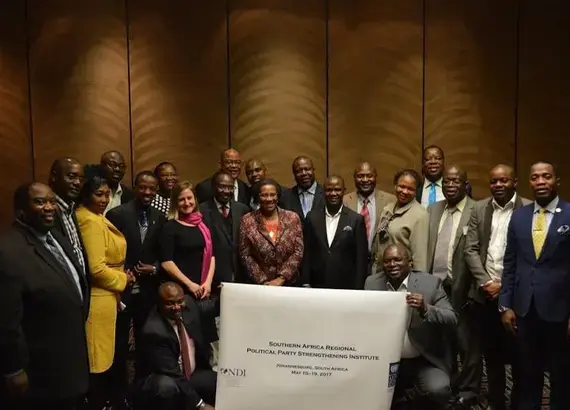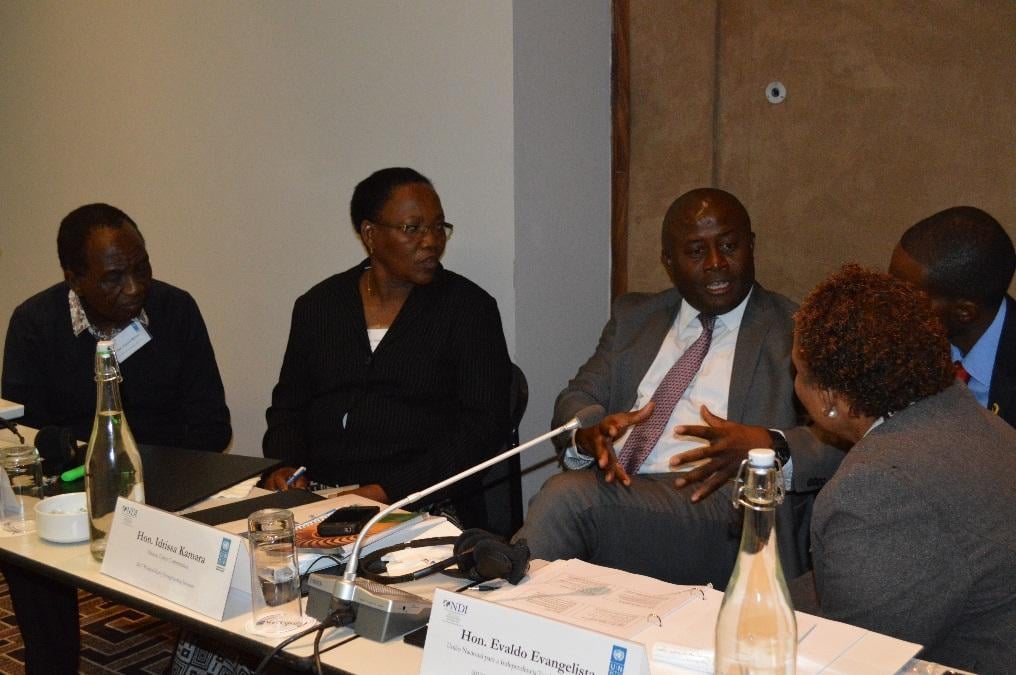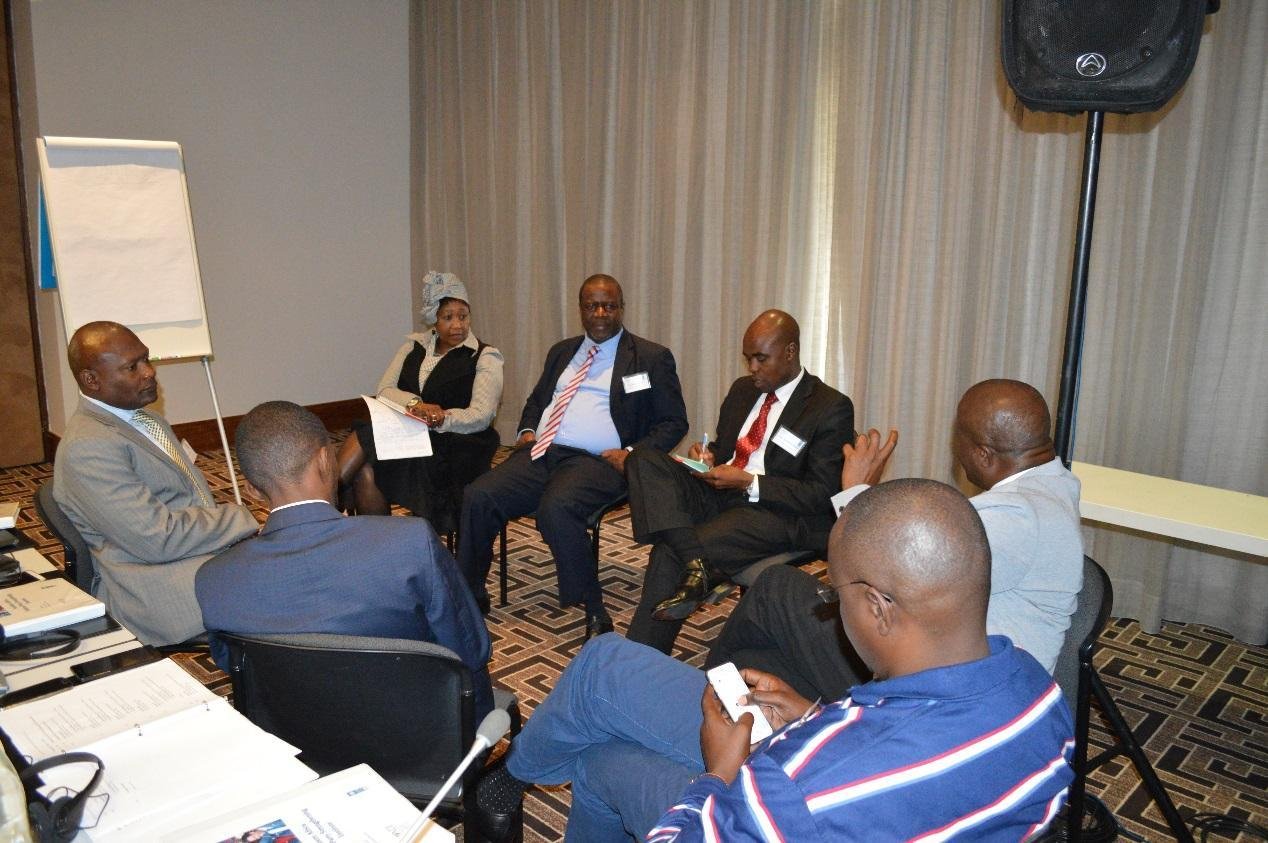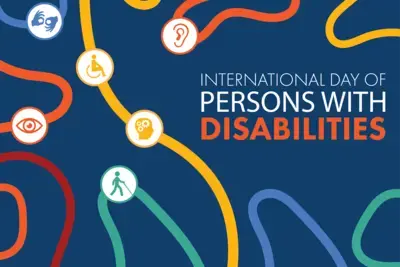
NDI’s Dr. Keith Jennings; Chancellor of Walter Sisulu University, Dr. Brigalia Bam; UNDP Regional Electoral Advisor, Dieudonne Tshiyoyo; and PPSI participants
Success Story
Political Leaders from Across Southern Africa Convene at NDI’s Third Political Party Strengthening Institute
NDI convened senior party leaders from 20 ruling and opposition parties from across Southern Africa in mid-May for the third iteration of the Political Party Strengthening Institute (PPSI). The week-long event convened party leaders from seven countries to engage in constructive cross-party democratic dialogue and peer-to-peer learning on how best to build inclusive, responsive and representative party structures that are equipped to address the challenges they face in their home countries. Held in Johannesburg, South Africa, four secretaries general and leaders from women and youth wings of 20 parties attended, representing Angola, Botswana, Malawi, Mozambique, South Africa, Tanzania and Zambia.
"PPSI presents a unique opportunity for political parties across the region to come together to discuss mutual challenges and ways to mitigate them to further enhance their political organizations," said Ivan Doherty, NDI senior associate and director of political party programs. "The program provides for both peer-to-peer learning and one-on-one consultations that foster mutual learning between and among party representatives, faculty trainers and NDI staff."

Participants working through a Strengths, Weakness, Opportunities, and Threats (SWOT) analysis during the session on “Strategic Planning for Party Development.”
“The program created a space and atmosphere for learning and an exchange of experiences. It was an exercise of frank and democratic discussions,” explained a participant.
Following last year’s PPSI in 2016, party representatives were asked to identify a project to implement that would strengthen their organizations. Among the themes these projects focused on increasing women’s political participation, managing party members through databases, and improving internal communication practices. Parties then identified and submitted work plans on their projects and received feedback and technical support from NDI staff and trainers. NDI staff and trainers reviewed the work plans to provide feedback and individualized supplemental technical support and resources. One participant commented, “I got several insights on implementing our [party’s] chosen project of coming up with a communication policy document.”
Leading up to the 2017 PPSI, these party representatives participated in one-on-one consultations to talk through the party’s progress, limitations in implementing their projects and strategies to mitigate challenges encountered. These meetings were highly successful and informed the agenda for this year’s PPSI. Follow-up consultations after the event’s end have reinforced the 2017 sessions, providing additional support to party representatives.
Building on previous iterations, the 2017 PPSI training sessions covered topics important to the democratic functioning of political parties, including:
- internal and external communication,
- using technology effectively,
- strategic planning, and
- enhancing inclusive party structures.

NDI’s Ivan Doherty, Sarah Travis, Evan Summers, and Regional Coordinator Maricela Donahue conduct individual consultations at the 2017 PPSI.
These individualized party consultations were beneficial to parties as they provided a confidential setting for participants to discuss the practical application of concepts and tools discussed in the group plenaries to their specific party needs.
While much of the recent political discourse in the region has been marked by a degree of discord and conflict, the atmosphere at the 2017 PPSI was relaxed and characterized by a palpable spirit of collegiality; this is particularly noteworthy given the participation of members from both ruling and opposition parties. PPSI provides a safe, open and constructive outlet for political dialogue and networking in a region where it is becoming increasingly difficult for such meetings to take place. “The most valuable part of the summit, apart from the presentations, was the interactions with colleagues from other parties and countries,” remarked one participant. This speaks volumes to the trust and relationships that have been built among participants since the program was first launched in March 2015.
Regional initiatives like PPSI support political parties to strengthen their organizations in becoming more inclusive, representative and responsive. NDI has cultivated strong relationships with the parties in the region. Party representatives are not only willing to discuss the issues and challenges their parties face, they have also been open to sharing their ideas, experiences and knowledge with their parties upon returning to their home countries, fostering meaningful engagement between the program and the parties it supports. “I am looking forward to applying what I have learned and share with my party members once am back and work on the workplan, a participated noted.

Participants discussing the social, economic and political implications of youth unemployment in the group work session on “Addressing Major Development Challenges: Governance and Youth Unemployment.”
PPSI also provides a platform to introduce party leaders to new research and other NDI initiatives in the region. Dr. Thomas Boston of the Georgia Institute of Technology and Youth Lab Director Pearl Pillay presented findings from NDI’s focus group research program during the event. The research, titled “Governance and Youth Unemployment in South Africa,” seeks to address the ways in which policies can alleviate the high youth unemployment rates in South Africa. Their presentations were followed by a participatory discussion on what parties can do to address these challenges. Participants also heard from Idrissa Kamara, political officer to the African Union’s Department of Political Affairs’ Democracy and Electoral Assistance Unit (DEAU), who provided an overview of the DEAU’s role within the African Union and captured feedback on ways in which the body can better address party needs.
“PPSI shows that strengthening nascent democratic political parties through dialogue is possible,” said Dr. Keith Jennings, NDI director for Southern and East Africa, reflecting on the program.
Based on the overwhelmingly positive feedback that NDI received from participants and the importance of effective political parties for democratic development in Southern Africa, NDI hopes to host PPSI again next year.
PPSI was made possible with support from the National Endowment for Democracy and the United Nations Development Programme (UNDP).



